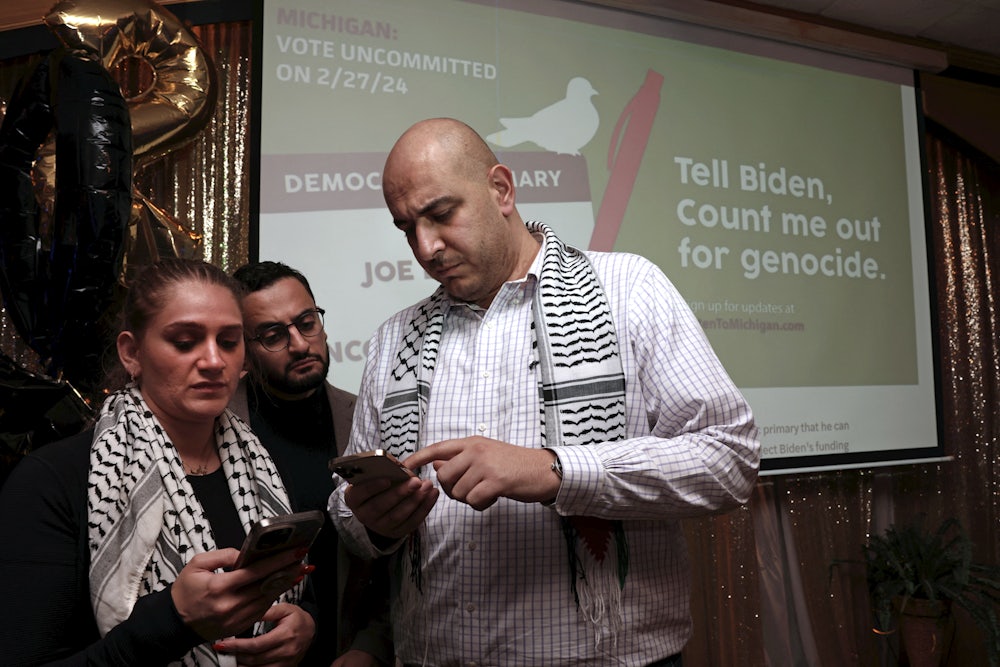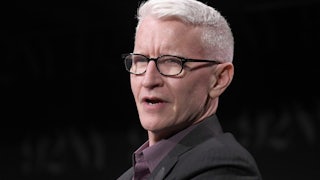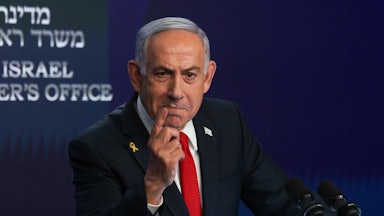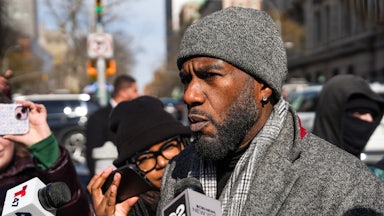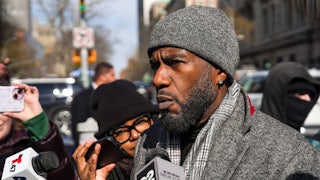Joe Biden has premised his reelection campaign on the idea that he will defend democracy against Trumpism. This election is “all about” determining whether democracy will survive, Biden said at his election year kick-off event in Valley Forge, Pennsylvania, in January. At last week’s State of the Union, he repeatedly referred to “freedom and democracy” being under threat at home and abroad. “As I’ve done ever since being elected to office,” Biden urged, “I ask you all, without regard to party, to join together and defend our democracy!”
It’s a little ironic, then, that democracy itself has been such a thorn in Biden’s side this election year. Starting with the Michigan primary, held on February 27, organizers working on shoestring budgets have turned out a sizable protest vote against the White House’s continued support for Israel’s brutal war on Palestine. In Michigan’s Democratic primary, 13.2 percent of participants voted “uncommitted”—a ballot option meaning “none of the above,” used to express discontent with the available options. Some states call it something else, like Massachusetts’ “no preference” option, while others require that voters select a candidate. In many states where voting “uncommitted” or its equivalent is an option, it’s had a strong showing. “Uncommitted” garnered 18.9 percent of Minnesota’s Democratic primary vote share. Twenty-nine percent of participants in Hawaii’s Democratic caucus went with “uncommitted,” as well, along with 9.5 percent of voters in Washington State this past week. As of now, with more primaries to go, three states (Michigan, Minnesota, and Hawaii) will send a total of 20 “uncommitted” delegates to this summer’s Democratic convention in Chicago.
“All we did is register at the ballot box what we know is happening on the ground,” says Abbas Alawieh, political strategist for Listen to Michigan, the group that lead the “uncommitted” effort in that state. After five years on Capitol Hill, most recently as Congresswoman Cori Bush’s chief of staff, Alawieh returned home to Dearborn in September to help care for a sick family member. “I was hoping to lay low for a while,” he told me over the phone. Soon after came the October 7 Hamas attacks and Israel’s subsequent, indiscriminate bombing campaign throughout Gaza, which has now killed over 30,000 people and created a dire humanitarian crisis. The International Court of Justice has found it “plausible” that Israel is committing acts that violate the Genocide Convention, echoing the findings of leading human rights organizations. Alawieh, who lived in Lebanon with his family during the 2006 war between Israel and Hezbollah, said his initial reaction was “dictated by my PTSD.”
“I was in this state of not being able to move for a few days,” he said. “After processing the initial shock and writing about it and talking to my therapist—shout-out to my therapist—I decided to jump back in.” That started by working with former colleagues, including Congresswoman Rashida Tlaib and her staff, to put together a resolution calling for an immediate cease-fire. “Being on the ground, the level of hurt, pain, and despair among people who are in Arab American, Palestinian American, and Muslim American communities, specifically, is so high,” Alawieh said. “I have cousins who’ve known I’m in politics for years who would never initiate a political conversation with me. Now their entire obsession is, ‘Why is our president funding a genocide of the people that we love?’”
Layla Elabed, Listen to Michigan’s campaign director, was having a similar experience during community organizing meetings in Dearborn. Back in December, she started having conversations about the election with people she was working with on campaigns fighting book bans and challenging the state’s for-profit electric utility, DTE. “I wasn’t even thinking about the primary, to be honest,” she said, explaining that her focus at that point had been on the general election. “A lot of people I talked to said, ‘I’m not going to vote,’” Elabed recalled, explaining their despair at the possibility of a Trump presidency and sense of “deep betrayal” by Biden. Her tentative plan had been to try to get people to turn out for down-ballot races. “If you feel strongly that you can’t put your support behind Biden or Trump, then skip the top of the ticket,” she relayed.
As the Michigan primary approached, though, Waleed Shahid—former communications director for the group Justice Democrats—began circulating a memo on how to channel widespread frustration with Biden’s support for Israel’s war on Palestine at the ballot box, as a means of ramping up pressure on the administration. It was modeled on the 2008 effort to vote “uncommitted” in support of Barack Obama, who didn’t appear on Michigan’s Democratic primary ballot that year. The idea resonated with Alawieh and Elabed, who participated in a series of Zoom calls with organizers in Michigan and around the country. In less than three weeks, they worked with groups around the state to mount a voter-contact effort that made more than 500,000 phone calls and sent over 600,000 texts to prospective voters.
It hasn’t just been Muslim and Arab American communities fueling the success of “uncommitted,” though. Young voters, as well, have made up a large percentage of “uncommitted” voters in Michigan, Minnesota, and elsewhere. A poll conducted last November found that 71 percent of Democrats in Michigan support a cease-fire. Another poll published in late February by Data for Progress found that two-thirds of likely voters nationwide—including 77 percent of Democrats and 69 percent of independents—support “the U.S. calling for a permanent ceasefire and a de-escalation of violence in Gaza.”
Given its unpopularity, Biden and other top Democrats’ continued support for Israel’s war complicates the party’s pitch as defending democracy. That support, moreover, involves backing an Israeli government whose own support for democracy isn’t exactly obvious. Beyond the long-standing subjugation of Palestinians in Gaza and the West Bank and well-documented support for genocide expressed by senior Israeli officials, Prime Minister Benjamin Netanyahu has also come under fire over attempts to kneecap his country’s independent judiciary. “Biden promised he was going to offer a fight against authoritarianism and fascism,” Elabed told me. “What we’ve seen is that he’s putting his support behind one of the most extremist governments on the planet.”
Since Michigan’s primary, Elabed said, she’s received a flood of “very hateful” messages coming from people who call themselves progressive Democrats. “Folks who on one hand say they care about policies that protect families that are undocumented have come at me—a Palestinian American born and raised here—saying that I’m going to get deported because I’m helping to get Trump elected.” From her perspective, though, “voters who vote ‘uncommitted’ are doing the most American, Democratic thing they can do—to say, as a Democrat, this is what I want. This is literally why we have a primary.”
There are signs that the “uncommitted” campaign and the broader antiwar movement is starting to leave a mark. Democratic Senate Majority Leader Chuck Schumer—long a stalwart defender of Israeli policy—this week called Netanyahu’s government an “obstacle to peace,” suggesting the United States could “play a more active role in shaping Israeli policy by using leverage.” The White House is reportedly considering placing conditions on its military aid to Israel should it launch a large-scale invasion of Rafah. Still, very little of that talk has translated into action. “It’s clear we’re having a big impact,” Alawieh said. “But we’re also witnessing a genocide unfold in real time. A cease-fire is the bare minimum. The fact that it hasn’t happened yet is a horrifying reality to be living in.”
